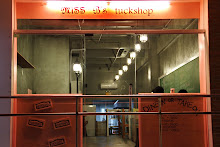Organic farm in Germany tests negative so far for bacterium, throwing source of contamination into doubt again
Peter Walker and Siobhan Dowling in Bienenbüttel, guardian.co.uk, Monday 6 June 2011 20.09 BST
An assistant opens packages of bean sprouts to be tested for E coli at the Lower Saxony food safety laboratory in Oldenburg, Germany. Photograph: Ingo Wagner/EPA
The source of Europe's E coli outbreak remains a mystery after German scientists said there was as yet no evidence from tests to link the bacterium to a farm in the northern state of Lower Saxony.
The results of laboratory tests came as a surprise, as ministers had earlier said there were "strong and clear indications" that bean sprouts from the Gärtenhof organic farm had spread the new and particularly virulent strain of E coli, which has so far killed 22 people and left 2,200 people ill.
A first set of 23 results from 40 samples taken at the farm were negative, Lower Saxony's agriculture ministry said in a statement.
"The search for the outbreak's cause is very difficult, as several weeks have passed since its suspected start," it said. "A conclusion of the investigations and a clarification of the contamination's origin is not expected in the short term."
This is the worst possible news for both German consumers, who face indefinite warnings against raw salad leaves, tomatoes and cucumbers, and, more acutely, farmers. Spain's farmers, whose cucumbers were wrongly at first blamed by German scientists, have suffered in particular. The news also came too late to prevent the small town of Bienenbüttel, 40 miles south of Hamburg in Lower Saxony's rural heartland, being overrun by media while police sealed off access to the farm. Its owner, Klaus Verbeck, told a local newspaper he was baffled at the apparent connection, given there were no animals or animal products on the site.
Locals on Bienenbüttel's modest main street of one-storey red brick buildings said they sympathised. "It's not nice for the farmer – it's like the Spanish with the cucumbers," said one woman, identifying herself only as Frau Köhler. "The farmer won't recover quickly, not after he's been dragged through the press."
Fabrizio de Cesaro, owner of the town's Italian ice cream parlour, said he had particular sympathy for the Spanish. "There was a Spanish TV station in town today," he said. "They probably wanted to get a little revenge on Germany. I think people should wait until they know for sure."
German officials said the farm could still be the source of the outbreak, even if all the tests come back negative. Bean sprouts had seemed a likely culprit, having previously been implicated in serious E coli outbreaks in the US and Japan. They are grown in water heated to 38C, ideal for bacteria to flourish. US scientists warn that young children, the elderly and those with weakened immune systems should not consume them raw, advice now taken up by the UK Food Standards Agency.
Hugh Pennington, the professor who led inquiries into two major UK outbreaks of E coli, said: "They've done experimental studies on contaminating bean sprouts and seeing what happens to the bacteria during sprouting, and you can get up to a million-fold increase in bacteria. It's like incubating a culture of bacteria."
The health crisis, which has seen doctors at hospitals in northern Germany work round the clock amid talk that some retired staff might be called in, has taken on a parallel political dimension.
Russia has angered the EU by banning fresh vegetable imports while relations between Germany and Spain have slumped.
In Luxembourg, Spain's health minister, Leire Pajín, said before a meeting with EU counterparts: "We want compensation for the grave and irreparable damage done to Spain. We condemn the slow response and are concerned about how this crisis has been managed from the very start."
Exports show little sign of picking up despite the all clear for Spanish produce, said Antonio Moreno of the Coag farmers' organisation in Almeria, where salad crops are a major part of the local economy. "I've had a farmer on the phone to me this morning saying that he cannot sell a single kilo of his summer tomatoes and he has had to ask for help to tear all the plants up."
How the blame has shifted
At various points in the last fortnight the finger of blame for the E coli outbreak has pointed at Spanish cucumbers, German bean sprouts and even, briefly, a specialist potato restaurant in a Baltic city.
• First to be implicated were cucumbers from Spain. As the infection spread late last month tests at a Hamburg market showed traces of an E coli bacterium. Sales of Spanish salad vegetables – a major export for the country – plummeted. Madrid protested, with the agriculture minister for Andalusia's regional government eating a cucumber on live TV to make a point. Just over a week ago Germany admitted it had got it wrong.
• A general warning remained in place for all Germans to avoid eating raw cucumbers, tomatoes or lettuce. Germany's agriculture minister, Ilse Aigner, said "hundreds" of tests had determined that most of those made ill had eaten these items, mainly in the north of the country.
• On 2 June, days after banning vegetables from Spain and Germany from import, Russia's government extended this to the entire EU. On the same day the World Health Organisation confirmed that the outbreak involved a new and more virulent form of E coli.
• On Saturday the focus fell, briefly, on the Kartoffel-Keller, a potato-themed restaurant in Lübeck, in Germany's north-east, after reports claimed it had been identified by scientists as a possible infection hotspot.
• The following day German officials said bean sprouts produced in Lower Saxony were the most likely source. Despite statements of increasing confidence about this, tests on Monday came back negative.


No comments:
Post a Comment